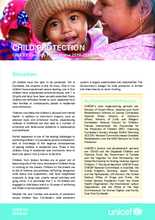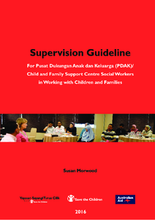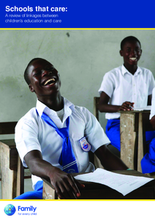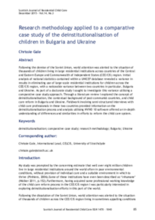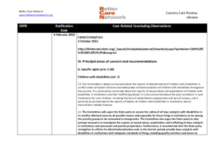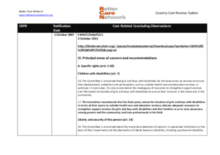Displaying 601 - 610 of 1025
This brief from UNICEF Cambodia describes UNICEF's plans and programs regarding child protection.
To obtain complete data on the child protection system and related problems in Ukraine, Hope and Homes for Children conducted a comprehensive study of the child protection system in Ukraine during the 2015 - 2016 time period. To ensure the integrity of the data, the structure of the study included components focused on different levels of the child protection system in Ukraine (national, regional and rayon), and combined both quantitative and qualitative approaches and methods. The system of institutional care was the main focus of the study.
This Supervision Guideline document from Save the Children contains guidelines and underlying principles for Pusan Dukungan Anak dan Keluarga (PDAK) child and family support centre social workers in working with children and families.
This report presents the key findings of a scoping study on the links between education and children’s care. The study involved a literature review in English, French and Spanish; key informant interviews; and consultations with 170 children, carers, teachers and other stakeholders in Guyana, India, Russia and Rwanda.
A press release from the Ministry of Women and Child Development, Government of India recapped a series of new initiatives by the Ministry during 2015. The achievements relevant to children’s care are briefly described below and include the launch of the flagship programme Beti Bachao Beto Padhao for protection of the girl child; several initiatives to track, restore, and rehabilitate missing children; and adoption reforms and a new foster care system.
According to the advocacy organization, First Focus, the U.S. Senate Finance Committee is planning to consider new legislation known as the Family First Act in January 2016. The legislation would direct investments at keeping children safe and supported at home and in family-like settings.
This study discusses a variance in results in eliminating use of large-scale residential institutions for children across the CEE/CIS region.
This country care review includes the care-related Concluding Observations adopted by the Committee on the Rights of Persons with Disabilities and the Committee on the Rights of the Child.
This country care review includes the care-related Concluding Observations adopted by the Committee on the Rights of Persons with Disabilities.
This country care review includes the care-related Concluding Observations adopted by the Committee on the Rights of Persons with Disabilities.

